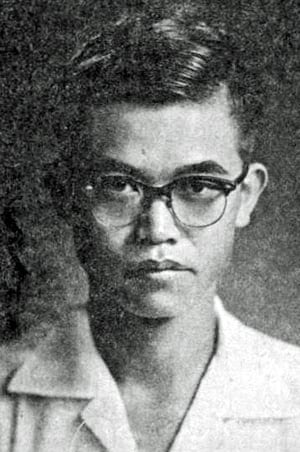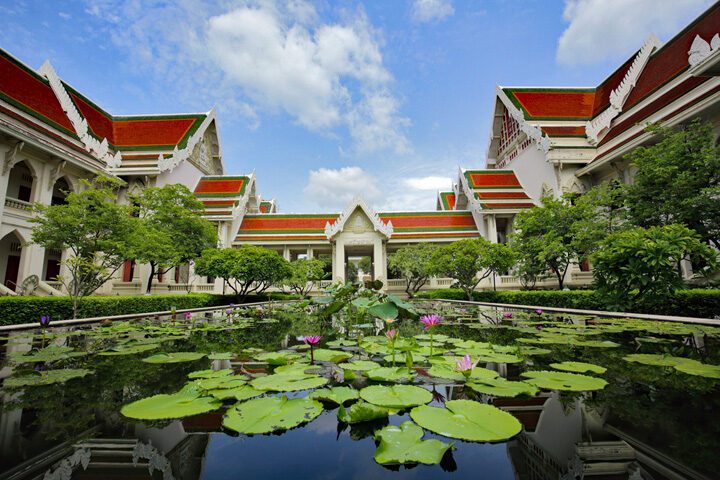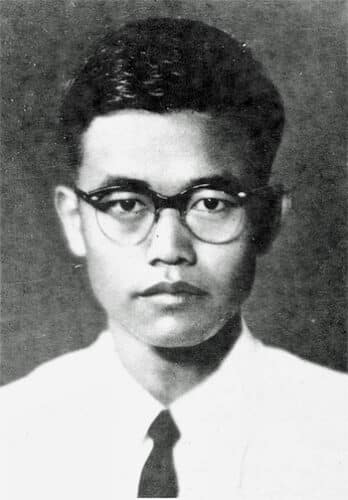Chit Phumisak, the Che Guevara of Thailand

Chit Phumisak – Photo: Wikimedia
The turbulent sixties in the Netherlands, the somewhat older readers of this blog undoubtedly remember the anarchist Provo movement with, among others, Roel van Duin, the student riots in Amsterdam culminating in the occupation of the Maagdenhuis. In many countries, the youth rebelled against the established order, the “flower power” reigned supreme.
Also among the youth Thailand people began to think socially critically, about which little is known abroad. What is known is the crushing of demonstrators by the right-wing clique in collaboration with the army. Between 1973 and 1976 there were some major massacres, but relatively little is known about the background. How could it come to these outbursts of violence. How was it possible that the repression of the state smothered that critical thinking, so much so that it seems that to this day there are no “critical” youth left in Thailand.
Because while at that time journalists in the West wrote their fingers blue about the elegant and friendly Thai royal couple, Queen Sirikit and King Bhumibol, in the West there was absolutely no interest in the many puddles of blood on the streets in Bangkok or on the country. Dozens if not hundreds of intellectuals fell victim to these massacres. It was the time of the Cold War and reporting on “left-wing” movements was “not desirable”.
Chit Phumisak was the idol of many Thai students at the time, who died much too soon. He was born on September 25, 1930 in a simple family in Prachinburi province, which borders Cambodia. He went to the temple school in his village, then to a public school in Samutprakan, where his talent for languages was discovered. Chit spoke Thai, Khmer, French, English and Pali. He later successfully studied linguistics at Chulalongkorn University in Bangkok. There he joined an academic discussion group suspected by the authorities.
The first time he was able to express his socialist ideas as a student was in 1953. He was hired by the American embassy in Bangkok to translate Marx's Communist Manifesto into Thai with an American, William J. Gedney. This action was intended to instill more fear in the Thai government for the communists, so that appropriate measures could be taken against communism, which was mainly intended to impress the common people.
In 1957, Chit Phumisak was appointed as a university lecturer in Phetchaburi, but a year later, on October 21, 1958, he and many other intellectuals were arrested for alleged communist sympathy. The reason was his anti-nationalist and socially progressive writings, especially Chomna Sakdina Thai, published in 1957. Loosely translated, the title could read “The true face of Thai feudalism”. The book was never fully translated into a Western language.
He wrote this certain anti-feudal work under the pseudonym of Somsamai Sisuttharaphan and the equally corrupt and strongly anti-communist pro-American government Sarit Thanarat, who was himself a multimillionaire with a lot of real estate, and was legally married to fifty (50) women , saw this as a serious threat.

Chulalongkorn University in Bangkok
Chit had already spent six years in prison until he was acquitted in December 1965 on the grounds of proven innocence. However, he was not left alone and was constantly threatened.
He went into hiding and joined the outlawed Communist Party of Thailand in the Phu Phan mountains of Sakon Nakhon. On May 5, 1966, according to the official version of 'villagers', he was shot dead in the village of Nong Kung, Waritchaphum district by a para-military group hired by a local mayor.

Chit Phumisak – Photo: Wikimedia
It was not until 1989 that his remains were exhumed and enshrined in a Buddhist ceremony in a stupa on the grounds of the nearby Wat Prasit Sangwon. The temple is now a memorial.
Chit Phumisak has left behind a surprisingly large number of publications in his short life. The list on his Thai Wikipedia page includes a large number of books in prose and poetry, linguistic history and general historical works, and song lyrics. He always had to publish under a pseudonym, such as Kanmueang Kawi (= “political poet”) and Kawi Si Sayam. (Kawi = poet; Mueang = Country, State, Sayam = “Siam”). His best-known scientific work, which appeared posthumously in 1977 and ran for 4 editions, is 'Khwam pen ma khong kham Sayam, Thai, Lao lae Khom' („The Origin of the Concept of Siam, Thai, Lao and Khom“). Even before his arrest, 'Sinlapa phuea chiwit, sinlapa phuea prachachon' ('Art for life, art for the people') was published in 1957.
For the students of the 1970s, as the singer and bandleader Nga Kharawan once said, Chit Phumisak became a kind of "Che Guevara of Thailand".


I thought Craig Reynolds' Thai radical discourse: the real face of Thai feudalism today was a complete translation. That book is on my shelf, but I must confess that it was rather heavy. The feudal Sakdina system and the traces it leaves to this day -says Chit-, capitalism and colonialism and the class struggle are discussed. Of course it also has a fairly extensive biography of Chit as an introduction.
Striking detail: Chit's book on Thai feudalism was co-sponsored by Prime Minister Phibun. 30 thousand baht was made available for the first publication. Possibly Phibun wanted to spread his chances - according to Reynolds - by not betting on the wrong horse again, as in WW2. Also, it could contribute to what may have been a socialist work, impressing Americans about the communist threat in Thailand.
Gedney, mentioned by Gringo, described Chit as “A versatile reader with an excellent knowledge of Khmer, one who had read 'practically everything'”. He was one of the most intelligent Thais Gedney had ever met. A rather meticulous young man with good manners and a determined course. Chit was as fascinated by high culture as he was critical of it. "I still wonder if he was like Red when I met him," Gedney said in an interview in 1980.
According to the biography, the Chit did not acquire his Marxism from abroad. Marx's work was easier to obtain in early 50s Bangkok than either Gedney or the Thai police realized.
The biography also notes that in the last two years of his studies at Chulalongkorn University, Chit also worked as a tour guide, taking tourists around Bangkok, Ayutthaya and the ancient Khmer ruins of Angkor Wat.
Nice additions, Rob V.
Chit (or Jit) Phumisak cannot be compared to Che Guevara. Chit was more of a thinker and writer and definitely not violent.
Listen to his most famous song 'Sterrelicht van Beradenheid', now widely sung at the current demonstrations: 'Let's keep hoping in these terrible times', is his message
https://www.youtube.com/watch?v=QVbTzDlwVHw&list=RDQVbTzDlwVHw&start_radio=1
The translation is here:
https://www.thailandblog.nl/achtergrond/jit-phumisak-dichter-intellectueel-revolutionair/